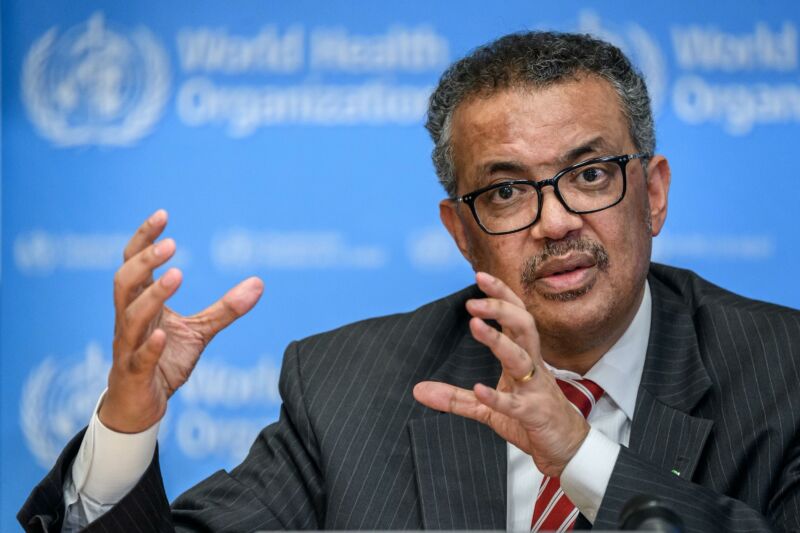Still in the WHO —
Trump said US would immediately exit WHO on May 29—it hasn’t happened.
Jon Brodkin
–

Enlarge / World Health Organization Director-General Tedros Adhanom Ghebreyesus at a press conference on COVID-19 at WHO headquarters in Geneva on March 11, 2020.
Getty Images | Fabrice Coffrini
On May 29, President Trump said his administration would take immediate action to withdraw the US from the World Health Organization.
“Because they have failed to make the requested and greatly needed reforms, we will be today terminating our relationship with the World Health Organization, and redirecting those funds to other worldwide and deserving, urgent global public health needs,” Trump said at the time, while criticizing the WHO’s response to the coronavirus pandemic and claiming that “China has total control” over the United Nations agency.
But now, two weeks later, there’s nothing to indicate that Trump has followed through on his plan. In an article yesterday titled “US hasn’t taken action to withdraw from WHO despite Trump pledge,” The Hill wrote that “no steps toward a formal withdrawal have been taken,” and that “a WHO spokesman told The Hill that the agency had received no formal notification that the United States would withdraw.”
Another article yesterday in Stat, a health news website, said that “none of the levers that would need to be pulled to follow through on [Trump’s WHO] decision has been pulled.” For example, the Trump administration has “not paid outstanding financial obligations to the WHO, a step that would be required before the United States could pull out under a joint resolution signed by Congress,” the article said.
“The US is not out of WHO”
These reports follow a Vanity Fair article published Monday that describes “the secret plan to unwithdraw from the WHO after Trump’s ‘bizarre,’ ‘ruinous’ exit.”
Trump’s WHO announcement “blindsided top federal officials,” who had been working “to salvage America’s relationship with the WHO” after Trump’s April decision to temporarily halt US funding and his criticism of the WHO in mid-May, Vanity Fair wrote. The article continued:
Now, Vanity Fair has learned, secret negotiations aimed at reversing Trump’s decision have begun between [US] Ambassador [Andrew] Bremberg and the WHO’s director general, Dr. Tedros Adhanom Ghebreyesus. A phone call Saturday between the two men resulted in a possible framework agreement to restore the relationship, which the US diplomatic corps views as essential to the global fight against coronavirus and myriad other public health issues.
The framework would allow for both increased scrutiny of China’s conduct and an independent review of the WHO’s performance in the first six months of the outbreak. And discussions continue over whether the WHO would exert pressure on China to turn over original samples of the live virus and allow its scientists to be interviewed regarding the virus’s origins. “It’s fair to say the US is not out of WHO, and negotiations are ongoing to address concerns and hopefully walk back from this decision,” said an official who participated in a call with G7 partners, an alliance of countries with advanced economies, where this information was shared.
The US generally provides about 15 percent of the WHO’s budget and gave the organization $893 million during the WHO’s two-year funding cycle that ended on December 31.
The Trump administration could still try to follow through on Trump’s announced plan. But Trump’s statement on May 29 was false insofar as he said the US would be “terminating our relationship” on that very day.
“Some question whether the president has the legal authority to pull the country out of the WHO—whose own constitution includes no mechanism for withdrawal by a member state,” Stat wrote. “Others argue that the only way the US can withdraw was prescribed in the joint resolution of Congress that passed in 1948, meaning the US would have to file a formal notice of its intention to leave and pay its outstanding financial obligations.”
A Health and Human Services (HHS) spokesperson said the US “will not be contributing funding to WHO but is happy to provide technical expertise or guidance to help end [the current Ebola] outbreak,” according to Stat. A State Department spokesperson “reiterated the president’s complaints against the agency and his intention to withdraw,” Stat also wrote.
US and WHO had “good discussion” on Ebola
There were seemingly conflicting statements at a press conference on Wednesday about whether the US continues to support the WHO financially.
“We had a very good discussion with [HHS] secretary [Alex] Azar last week and he assured me of US’ continued commitment to support in the fight, especially against Ebola,” the WHO’s Dr. Tedros said. But later in the same press conference, Tedros clarified that he “didn’t say” whether the WHO is “receiving funding directly from the US” for the fight against Ebola in the Democratic Republic of the Congo.
“I said it many times, I think in our relationship with the US, it’s not about the money,” Tedros said. “You know, working together, the relationship, I think, is more important, and [I] hope we will work side by side to control or contain the outbreak in western DRC as soon as possible, but the cooperation doesn’t involve the financing part directly to WHO.”
Dr. Anthony Fauci, director of the National Institute of Allergy and Infectious Diseases, expressed his support for a continued US/WHO partnership yesterday. “I would hope that we could continue to benefit from what the WHO can do at the same time that they continue to improve themselves,” Fauci told CBC News. “I’ve had good relationships with the WHO and the world needs the WHO.”

